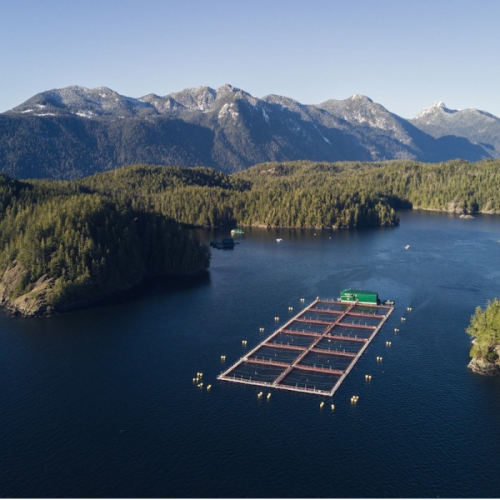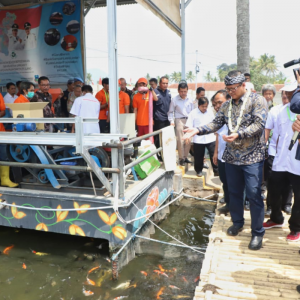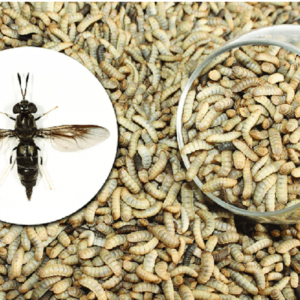
Growing Fish on Land Will Exacerbate Climate Change
| Tue, 27 Oct 2020 - 13:50
More than 80,000 scientists across the world, sounding an urgent climate change alarm, are calling for immediate cuts to global Greenhouse Gas (GHG) emissions, which will increase substantially, should Canada bow to activism that wants salmon farmers to grow fish on land.
In an unprecedented statement released today, the American Fisheries Society (AFS) joined forces with 110 aquatic societies representing the scientists, to predict catastrophic impacts to commercial, recreational, and subsistence fisheries, unless urgent action is taken to reduce GHG.
“Swift and resolute action by governments and by individuals to reduce emissions is essential to halt irreversible impacts to freshwater and marine ecosystems, fish, and fisheries from climate change. We must act now to safeguard our drinking water, food supplies, and human health and well-being,” said American Fisheries Society President Scott Bonar.
Canada’s sustainable and energy-efficient salmon farmers are under attack on both coasts by small groups of activists who want the government to transition open-net ocean aquaculture to land-based tank farms.
Also read: Marine Ingredients Are Stable in Volume, Strategic in Aquaculture Nutrition
Bowing to this pressure, mostly coming from voter-rich areas at the expense of rural coastal communities, the government said it is working to get a plan to move ocean-based salmon farms in British Columbia to land-based operations by 2025.
The activists claim, without credible evidence, that fish farmed in the ocean will decimate wild stocks, despite scientists saying that both wild and farmed can thrive together in the ocean environment.
Recently, Canada’s Department of Fisheries and Oceans, released eight peer-reviewed pathogen transfer assessments that show farmed salmon pose minimal risks to migrating wild stocks in British Columbia. A ninth, expected to have the same conclusion, is due this week.
Several other studies, from government, industry and independent scientists have also shown that growing fish on land to market size will impact climate change, at a greater pace because of the increased demands for freshwater, land and energy for land-based fish farming.
Current estimates show that some two billion kg of salmon (world production) grown on land-based farms would produce 526 billion kg greenhouse gas emissions.
Also read: Maine Shellfish Farmers Gaining Confidence With Scallops
Growing the global supply of salmon on land would require the same amount of energy per year needed to power a city of 1.2 million people and contribute to higher CO2 emissions.
The current production in Canada alone would require 28,000 Canadian football fields, 33,719 acres, or 159 sq. km of land to grow fish in appropriate densities in land-based systems.
Raising land based salmon also costs 12 times more than ocean farming, the studies have shown.
Terry Brooks, a veteran fish farmer in British Columbia knows this first hand after shutting down his land-based Coho salmon farm last month.
“We just could not compete because of the costs and water and energy requirements,” he told SeaWestNews.
This farm is the latest of many failed attempts to grow either Pacific or Atlantic salmon in land-based recirculating aquaculture systems (RAS) over the past 20 years.
Also read: Researchers Succeed in Fortifying Oysters with Vitamins
Brooks now has a successful Sablefish operation that has a hatchery on Salt Spring island with ocean farms in Kyuquot Sound on Vancouver’s Island’s west coast.
Tim Kennedy, president and chief executive of the Canadian Aquaculture Industry Alliance in an earlier interview with SeaWestNews said the largest potential carbon reduction gains for global food production lie in the sustainable expansion of marine aquaculture.
“Canada has such a massive opportunity – largely untapped – for its oceans and ocean farming to be an important solution to climate mitigation,” he said.
The signatories in today’s call to cut GHG include The World Aquaculture Society, which has stated that it “appreciates the opportunity to team with other aquatic scientific societies in support of this initiative. Aquaculture’s ability to help alleviate the world’s need for quality protein sources is threatened by climate change.”
“Aquaculture, both freshwater and marine, employs over 21 million people and in 2018 accounted for 46 percent of global fish and seafood production and 52 percent of fish and seafood for human consumption. The impacts of human-caused climate change on production systems threaten this vital source of income and food security,” said Jimmy Avery, president of the World Aquaculture Society.
Global aquaculture production (including aquatic plants) in 2018 was 114.5 million tonnes, with the first-sale value estimated at $250 billion. UN-FAO statistics indicate that 20.5 million people were engaged in the aquaculture sector in 2018. Foodfish production occurs in both inland, freshwater systems (62 percent) and marine environments (38 percent).
Also read: Innovation Award 2020 Finalist: Aquaterra from Nuseed
Last year, the High Level Panel for a Sustainable Ocean Economy said in a report entitled ‘The Future of Food from the Sea’ that land-based aquaculture competes with other sectors for freshwater and land for production sites — neither of which are as constraining for ocean-based aquaculture production.
Authored by an esteemed collective of scientists in support of the High Level Panel – a group of 14 heads of government, including Prime Minister Justin Trudeau – the report concluded
that smarter management of wild fisheries and the sustainable development of marine aquaculture the ocean could supply over six times more food than it does today, while helping restore the health of ocean ecosystems.
Christopher Costello, lead author of the paper said: “The ocean has great, untapped potential to help feed the world in the coming decades, and this resource can be realised with a lower environmental footprint than many other food sources.”
Source: Sea West News






















